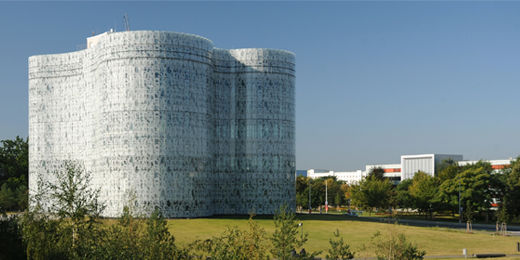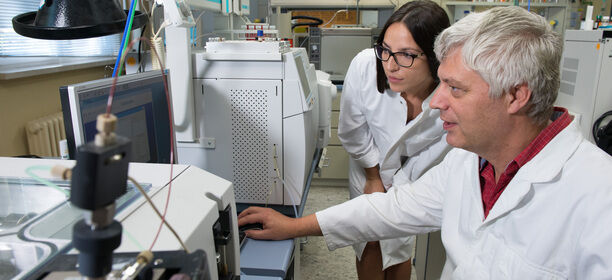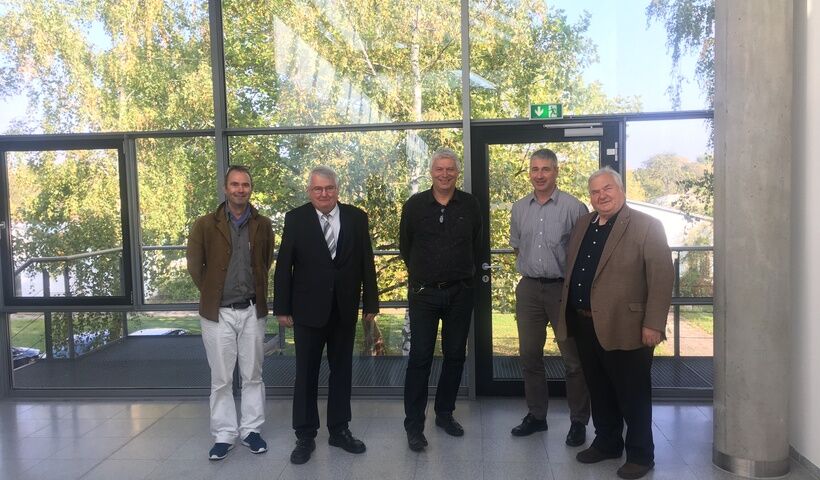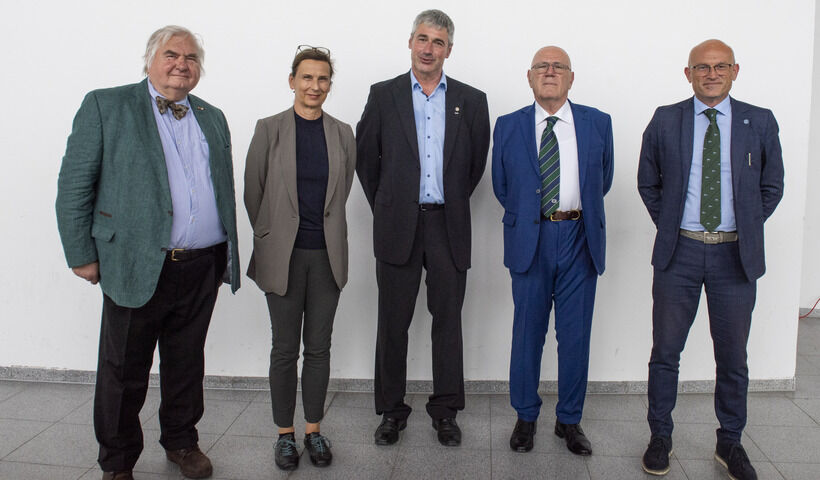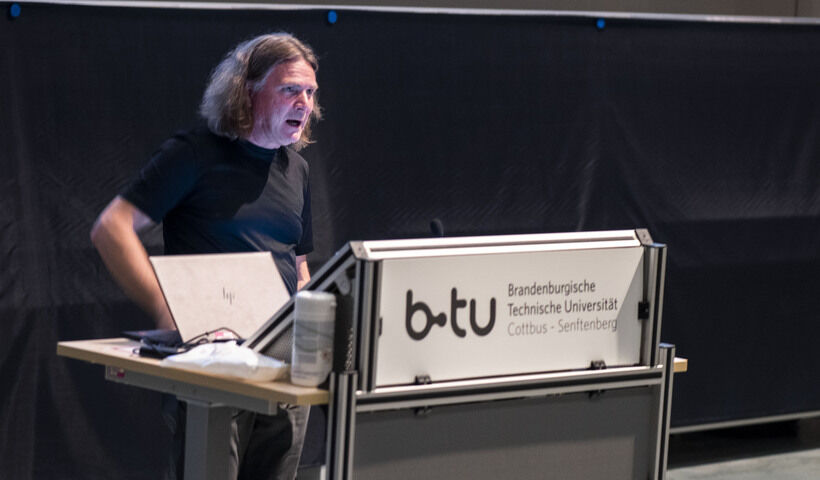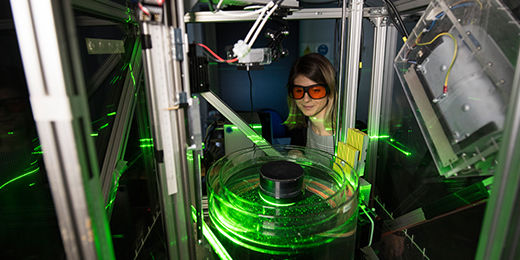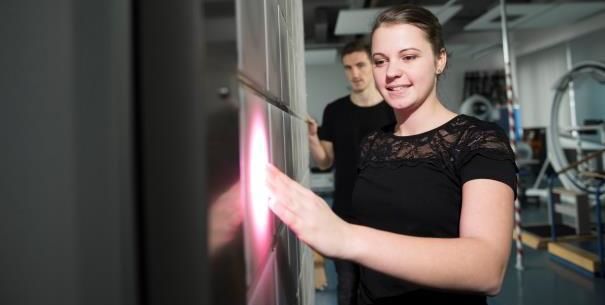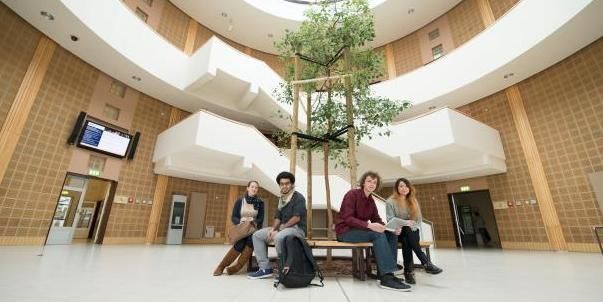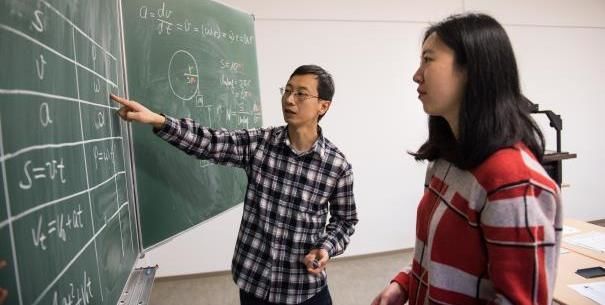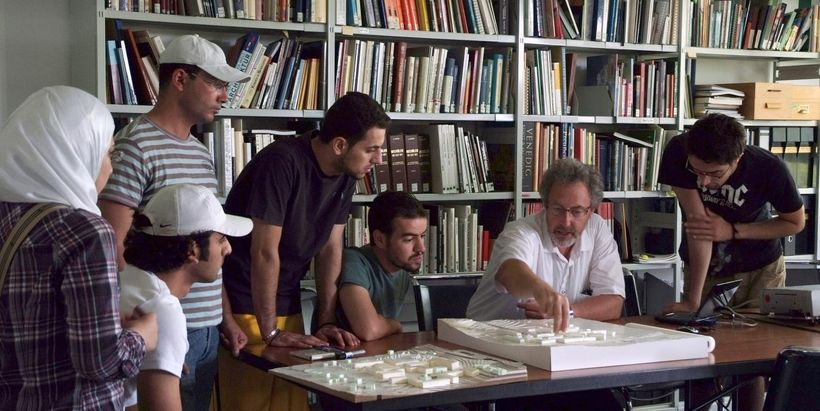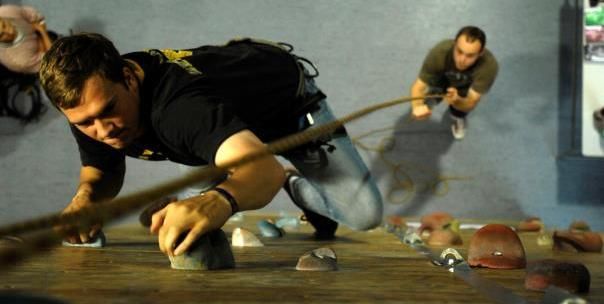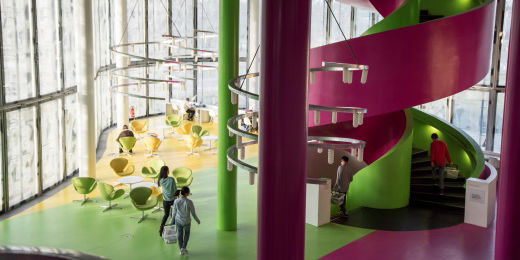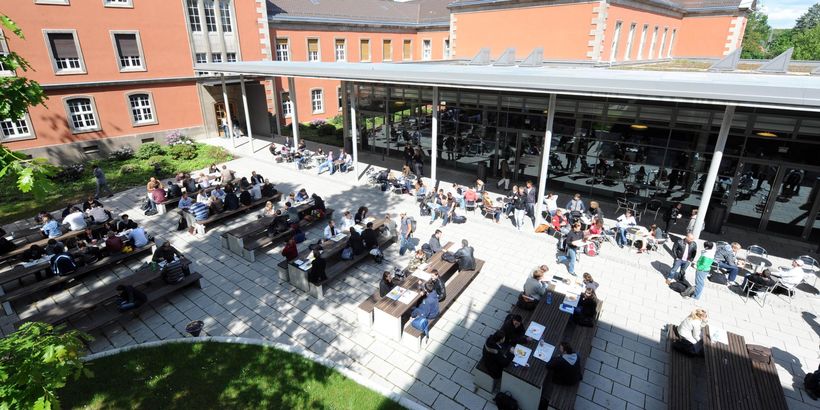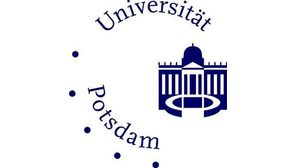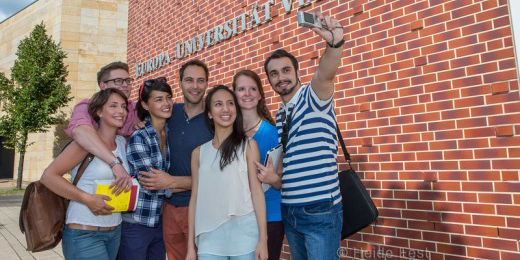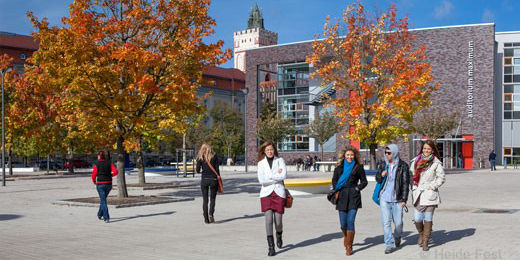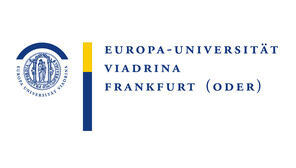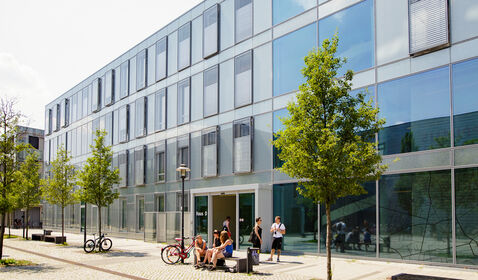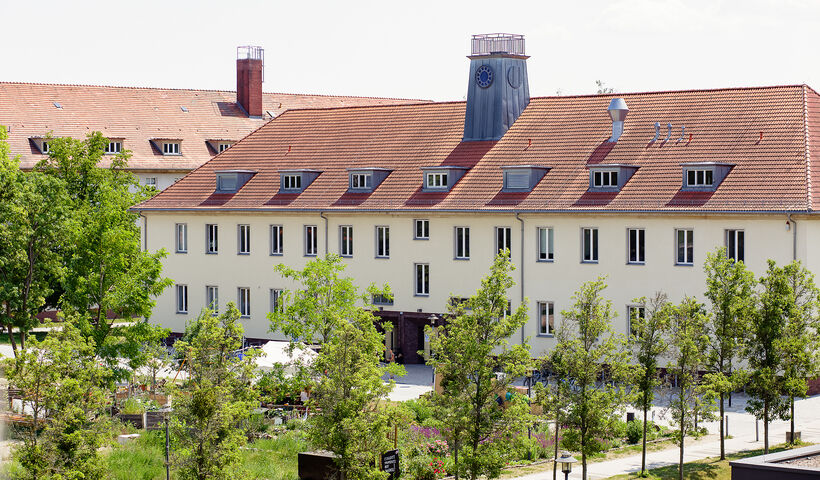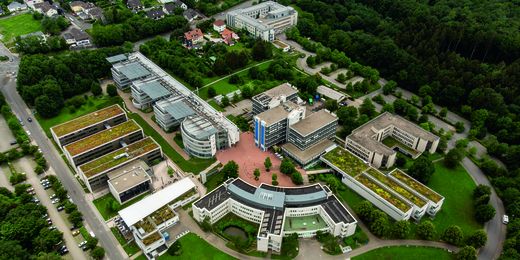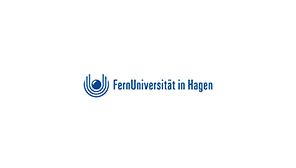Brandenburgische Technische Universität Cottbus-Senftenberg
- Promotionsrecht: Ja
- Trägerschaft: öffentlich-rechtlich
- 2013 gegründet
- 6.587 Studierende
Die BTU verbindet herausragende internationale Forschung mit zukunftsorientierter Lehre. Als Technische Universität bietet die BTU ein bundesweit einzigartiges Lehrkonzept: Bei uns können Studiengänge universitär, anwendungsbezogen oder dual studiert werden.
Hochschule im Fokus
Bei uns sind Sie richtig!
Wenn Sie eine Universität mit individuellen Entfaltungsmöglichkeiten suchen, dann sind Sie an der BTU Cottbus–Senftenberg genau richtig!
Anders als große technische Universitäten können wir optimale Rahmenbedingungen für ein erfolgreiches Studium bieten. Bereits für die Studienorientierung und Studienvorbereitung haben wir maßgeschneiderte Informations- und Beratungsangebote. Wir sind bekannt für unsere sehr gute Betreuungssituation und die unkomplizierte, persönliche Kommunikation zwischen Lehrenden und Studierenden.
Unsere guten BTU-Studienbedingungen, die immer wieder durch die Rankingergebnisse des CHE bestätigt werden, sind auf eine sehr gute Betreuungsrelation zurückzuführen. So listet beispielsweise das aktuelle Ranking vom Mai 2017 die Fächer Architektur, Informatik, Wirtschaftsingenieurwesen und Soziale Arbeit in der Spitzengruppe.
Ein weiteres wesentliches Plus unserer jungen Universität ist ihre hervorragende technische Ausstattung: hochmoderne Labore, ansprechende Hörsäle und eine traumhaft schöne Bibliothek.
Wendeltreppe im IKMZ (Informations, Kommunikations- und Medienzentrum) am Zentralcampus Cottbus (Foto: MMZ, BTU)
Auf dem Campus wie auch in Cottbus und Senftenberg gibt es für engagierte junge Menschen jede Menge Freiräume in allen Bereichen des gesellschaftlichen Lebens.
Stimmen von Studierenden
Platz der Dt. Einheit 1
03046 Cottbus
Tel: 0355 69-0
Fax: 0355 69-2768
Hochschule im CHE-Ranking abschneiden.
Die Brandenburgische Technische Universität Cottbus-Senftenberg gehört zu den Universitäten.
Ja, du kannst an der Brandenburgische Technische Universität Cottbus-Senftenberg promovieren.
Die Brandenburgische Technische Universität Cottbus-Senftenberg ist eine öffentlich-rechtliche Hochschule. Es gibt staatliche und staatlich anerkannte Hochschulen, die meist in Universitäten, Fachhochschulen (international: University of Applied Sciences) und Kunst- sowie Musikhochschulen unterteilt werden. Der überwiegende Teil der Hochschulen wird vom Staat finanziert und befindet sich daher in staatlicher Trägerschaft. Dort fallen in der Regel nur geringe Semesterbeiträge an. An den privaten Hochschulen hingegen, die sich über private Trägerschaften finanzieren, können wesentlich höhere Studiengebühren anfallen. Einen Weg, die finanziellen Hürden dieser Hochschulen zu umgehen, können Stipendien darstellen.
Es gibt außerdem Hochschulen, die von der protestantischen oder katholischen Kirche betrieben werden.
Die Brandenburgische Technische Universität Cottbus-Senftenberg wurde im Jahr 2013 gegründet.
Insgesamt gibt es 6587 Studierende an der Brandenburgische Technische Universität Cottbus-Senftenberg.
Standorte dieser Hochschule sind Cottbus, Senftenberg und Cottbus/Sachsendorf.
Hier findest du die Fristen und Termine für deine Bewerbung:
- Vorlesungszeit:
-
14.10.2024 - 09.02.2025
- Studienanfänger:
-
20.04.2024 - 15.09.2024Frist für Instrumental- und Gesangspädagogik: 31.08.24
- Hochschulwechsler:
-
20.04.2024 - 15.09.2024Frist für Instrumental- und Gesangspädagogik: 31.08.24
- International Studierende aus der Europäischen Union:
-
01.03.2024 - 31.08.2024
- International Studierende aus Staaten, die nicht Mitglied der EU sind:
-
01.03.2024 - 15.07.2024
- Studienanfänger:
-
20.04.2024 - 15.07.2024
- Hochschulwechsler:
-
20.04.2024 - 15.07.2024
- International Studierende aus der Europäischen Union:
-
20.04.2024 - 15.07.2024
- International Studierende aus Staaten, die nicht Mitglied der EU sind:
-
01.03.2024 - 15.07.2024
- Studienanfänger:
-
20.04.2024 - 31.08.2024
- Hochschulwechsler:
-
20.04.2024 - 31.08.2024
- International Studierende aus der Europäischen Union:
-
01.03.2024 - 15.08.2024
- International Studierende aus Staaten, die nicht Mitglied der EU sind:
-
01.03.2024 - 15.07.2024-für die Studiengänge Cyber Security, Power Engineering, Environmental and Resource Management Bewerbungsfrist von 01.03.24 bis 15.05.2024
-für die Studiengänge World Heritage Studies (online) Fernstudium von 01.03.23 bis 15.08.24
- Studienanfänger:
-
20.04.2024 - 15.07.2024
- Hochschulwechsler:
-
20.04.2024 - 15.07.2024
- International Studierende aus der Europäischen Union:
-
01.03.2024 - 15.07.2024
- International Studierende aus Staaten, die nicht Mitglied der EU sind:
-
01.03.2024 - 15.07.2024
- Vorlesungszeit:
-
08.04.2024 - 21.07.2024
- Studienanfänger:
-
Eine Bewerbung zum Sommersemester (in Bachelor-Studiengänge, 1. FS) ist nicht möglich, außer für Wirtschaftsmathematik und Digitale Gesellschaft (01.12.23-15.03.24).
- Hochschulwechsler:
-
Die Frist ist abgelaufen
- International Studierende aus der Europäischen Union:
-
Die Frist ist abgelaufen
- International Studierende aus Staaten, die nicht Mitglied der EU sind:
-
Die Frist ist abgelaufen
- Studienanfänger:
-
Eine Bewerbung zum Sommersemester (in Bachelor-Studiengänge, 1. Fachsemester) ist nicht möglich.
- Hochschulwechsler:
-
Die Frist ist abgelaufen
- International Studierende aus der Europäischen Union:
-
Die Frist ist abgelaufen
- International Studierende aus Staaten, die nicht Mitglied der EU sind:
-
Die Frist ist abgelaufen
- Studienanfänger:
-
Die Frist ist abgelaufen
- Hochschulwechsler:
-
Die Frist ist abgelaufen
- International Studierende aus der Europäischen Union:
-
Die Frist ist abgelaufen
- International Studierende aus Staaten, die nicht Mitglied der EU sind:
-
Die Frist ist abgelaufen
- Studienanfänger:
-
Die Frist ist abgelaufen
- Hochschulwechsler:
-
Die Frist ist abgelaufen
- International Studierende aus der Europäischen Union:
-
Die Frist ist abgelaufen
- International Studierende aus Staaten, die nicht Mitglied der EU sind:
-
Die Frist ist abgelaufen
Als Fakultät wird eine Gruppe von Fächern oder eine Abteilung mit mehreren Wissenschaftsbereichen bezeichnet. Sie bildet eine
Lehr- und Verwaltungseinheit und ist für die Organisation von Forschung, Lehre und dem Studium an sich des jeweiligen Fachbereichs
verantwortlich.
An der Brandenburgische Technische Universität Cottbus-Senftenberg gibt es folgende Fakultäten und Fachbereiche:
Fakultät 1
MINT - Mathematik, Informatik, Physik, Elektro- und Informationstechnik
Fakultät 2
Umwelt und Naturwissenschaften
Fakultät 3
Maschinenbau, Elektro- und Energiesysteme
Fakultät 4
Soziale Arbeit, Gesundheit und Musik
Fakultät 5
Wirtschaft, Recht und Gesellschaft
- Vorlesungszeit:
-
14.10.2024 - 09.02.2025
- Studienanfänger:
-
20.04.2024 - 15.09.2024Frist für Instrumental- und Gesangspädagogik: 31.08.24
- Hochschulwechsler:
-
20.04.2024 - 15.09.2024Frist für Instrumental- und Gesangspädagogik: 31.08.24
- International Studierende aus der Europäischen Union:
-
01.03.2024 - 31.08.2024
- International Studierende aus Staaten, die nicht Mitglied der EU sind:
-
01.03.2024 - 15.07.2024
- Studienanfänger:
-
20.04.2024 - 15.07.2024
- Hochschulwechsler:
-
20.04.2024 - 15.07.2024
- International Studierende aus der Europäischen Union:
-
20.04.2024 - 15.07.2024
- International Studierende aus Staaten, die nicht Mitglied der EU sind:
-
01.03.2024 - 15.07.2024
- Studienanfänger:
-
20.04.2024 - 31.08.2024
- Hochschulwechsler:
-
20.04.2024 - 31.08.2024
- International Studierende aus der Europäischen Union:
-
01.03.2024 - 15.08.2024
- International Studierende aus Staaten, die nicht Mitglied der EU sind:
-
01.03.2024 - 15.07.2024-für die Studiengänge Cyber Security, Power Engineering, Environmental and Resource Management Bewerbungsfrist von 01.03.24 bis 15.05.2024
-für die Studiengänge World Heritage Studies (online) Fernstudium von 01.03.23 bis 15.08.24
- Studienanfänger:
-
20.04.2024 - 15.07.2024
- Hochschulwechsler:
-
20.04.2024 - 15.07.2024
- International Studierende aus der Europäischen Union:
-
01.03.2024 - 15.07.2024
- International Studierende aus Staaten, die nicht Mitglied der EU sind:
-
01.03.2024 - 15.07.2024
- Vorlesungszeit:
-
08.04.2024 - 21.07.2024
- Studienanfänger:
-
Eine Bewerbung zum Sommersemester (in Bachelor-Studiengänge, 1. FS) ist nicht möglich, außer für Wirtschaftsmathematik und Digitale Gesellschaft (01.12.23-15.03.24).
- Hochschulwechsler:
-
Die Frist ist abgelaufen
- International Studierende aus der Europäischen Union:
-
Die Frist ist abgelaufen
- International Studierende aus Staaten, die nicht Mitglied der EU sind:
-
Die Frist ist abgelaufen
- Studienanfänger:
-
Eine Bewerbung zum Sommersemester (in Bachelor-Studiengänge, 1. Fachsemester) ist nicht möglich.
- Hochschulwechsler:
-
Die Frist ist abgelaufen
- International Studierende aus der Europäischen Union:
-
Die Frist ist abgelaufen
- International Studierende aus Staaten, die nicht Mitglied der EU sind:
-
Die Frist ist abgelaufen
- Studienanfänger:
-
Die Frist ist abgelaufen
- Hochschulwechsler:
-
Die Frist ist abgelaufen
- International Studierende aus der Europäischen Union:
-
Die Frist ist abgelaufen
- International Studierende aus Staaten, die nicht Mitglied der EU sind:
-
Die Frist ist abgelaufen
- Studienanfänger:
-
Die Frist ist abgelaufen
- Hochschulwechsler:
-
Die Frist ist abgelaufen
- International Studierende aus der Europäischen Union:
-
Die Frist ist abgelaufen
- International Studierende aus Staaten, die nicht Mitglied der EU sind:
-
Die Frist ist abgelaufen
Fakultät 1
MINT - Mathematik, Informatik, Physik, Elektro- und Informationstechnik
Fakultät 2
Umwelt und Naturwissenschaften
Fakultät 3
Maschinenbau, Elektro- und Energiesysteme
Fakultät 4
Soziale Arbeit, Gesundheit und Musik
Fakultät 5
Wirtschaft, Recht und Gesellschaft
Breites Spektrum an Berufsperspektiven
Mehr als 60 Bachelor- und Master-Studiengänge an drei Standorten bieten ein breites Spektrum an Berufsperspektiven für den regionalen, nationalen und internationalen Arbeitsmarkt. Das innovative Lehrkonzept ermöglicht bedarfsgerechte Studienmodelle mit hoher Durchlässigkeit, Praxisbezug und arbeitsmarktorientierten Vertiefungsmöglichkeiten. Die Palette reicht von Natur- und Ingenieurwissenschaften über Wirtschafts- und Kulturwissenschaften bis hin zu Gesundheitswissenschaften.
Unsere moderne und hervorragend ausgestattete Universität bietet für lernbegeisterte und leistungsbereite Studierende aus allen Ländern der Erde einzigartige Studiengänge und Vertiefungsmöglichkeiten. Diese sind Basis für erfolgreiche Studienabschlüsse, die auf den regionalen, nationalen und internationalen Arbeitsmarkt zugeschnitten sind. Wir vermitteln Freude an Forschung, Technik und Praxis und fördern die Entwicklung unserer Studierenden zu weltoffenen Menschen mit gesellschaftlicher Urteilskraft. Wir verstehen uns als Campusuniversität mit drei Standorten und kommen so den individuellen Bedürfnissen unserer Studierenden entgegen.
An unserer Universität wird ein enger Austausch zwischen Studierenden und Lehrenden gelebt.
Wir stehen für ein hohes wissenschaftliches und didaktisches Niveau in der Lehre. Unser innovatives Lehrkonzept mit seiner hohen Durchlässigkeit wird mit Angeboten der Studienvorbereitung, Berufsorientierung und Kompetenzförderung ergänzt.
In unserem College, dem Zentrum für Studierendengewinnung und Studienvorbereitung, können Sie Ihre Fähigkeiten vor Studienbeginn nochmals prüfen. Vorbereitungskurse bieten die Möglichkeit, Wissenslücken zu schließen oder Vergessenes wieder aufzufrischen.
Beste Chancen für beruflich Qualifizierte
Sie interessieren sich für ein Studium, wissen aber noch nicht genau, welcher Studiengang wirklich zu Ihnen passt? Dann entscheiden Sie sich für College+. In zwei Semestern nehmen Sie an unserem Vorstudium teil. Dieses Vorstudium unterstützt Sie bei Ihrer Suche nach einem Ihren Neigungen und Fähigkeiten entsprechenden Studiengang. Und das Gute daran: die Studiengangsmodule, die Sie belegen, werden bereits in dem Studiengang angerechnet, für den Sie sich später entscheiden. Dadurch verlieren Sie keine Zeit und gewinnen gleichzeitig Einblicke in die Vielfalt aller Bachelorstudiengänge unserer Universität. Und ganz nebenbei eignen Sie sich studienrelevantes Wissen an und können eventuelle Defizite ausgleichen.


